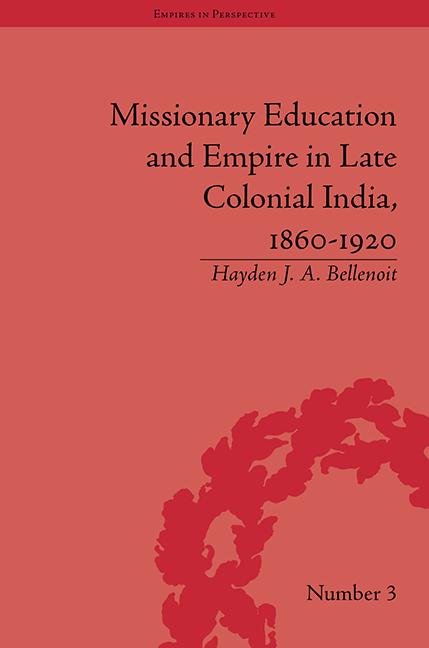Book contents
- Frontmatter
- CONTENTS
- List of Tables
- Acknowledgments
- Glossary
- List of Abbreviations
- Introduction
- 1 Knowledge, Religion and Education in Early Modern India
- 2 British Fears and Indian Society in the Emergence of North Indian Education, c. 1860–1920
- 3 Between East and West: Orientalism, Representations of and Engagements with India
- 4 The Failures of Education and its Sociological Bearings
- 5 Religious Interaction, the Curriculum and Indian Contestations of Late Colonial Knowledge
- 6 Maintaining Missionary Influence: Nationalism, Politics and the Raj c. 1870–1920
- Conclusion
- Notes
- Works Cited
- Index
Conclusion
- Frontmatter
- CONTENTS
- List of Tables
- Acknowledgments
- Glossary
- List of Abbreviations
- Introduction
- 1 Knowledge, Religion and Education in Early Modern India
- 2 British Fears and Indian Society in the Emergence of North Indian Education, c. 1860–1920
- 3 Between East and West: Orientalism, Representations of and Engagements with India
- 4 The Failures of Education and its Sociological Bearings
- 5 Religious Interaction, the Curriculum and Indian Contestations of Late Colonial Knowledge
- 6 Maintaining Missionary Influence: Nationalism, Politics and the Raj c. 1870–1920
- Conclusion
- Notes
- Works Cited
- Index
Summary
This book has intended primarily as a contribution towards South Asian history. It has moved, in contrast to more recent and established works on Indian education, towards a more penetrating account of modern Indian educational experiences. It has argued that the colonial education system – via this missionary educational enterprise – may have seemed dominating, restrictive and disruptive on the surface, but upon closer inspection was being actively shaping from within by Indians. It has also argued for a wider interpretation of pedagogy, by relating local ‘on-the-spot’ examples to wider intellectual debates, political and religious movements. In doing so, Indian students, saints and scholars all fashioned their own versions of religious and intellectual modernity. These were significant, for many of these intellectual debates were also patriotic ones. This has been another aim of the book – to link pedagogy and patriotism. It has argued that patriotism, rather than being a pure by-product of a shared educational experience, was in fact nurtured within it at many different levels and for many different reasons. Colonial education seems, upon closer inspection, a much more multilayered artichoke than scholars have assumed.
Yet this is not to argue too far in one direction. There were, of course, ways in which Indians were not able to shape the educational enterprise, and acute limits to the ability of Indian forces to mould north Indian education. The centralizing tendency of the bureaucratic Department of Public Instruction ensured that – given its ability to enforce conformity with grants – it could homogenize and streamline what were previously heterogeneous and diverse pedagogical traditions. Much of the Mahajani component of local village schooling of petty shopkeepers and their progeny, for example, was largely subsumed by the modern, centralizing system of India's conquerors, though there were some instances of it being incorporated into the rubric of the modern curricula. Local zilla schools were also absorbed into overly-ambitious schemes of village education, especially after 1900; the demands for efficiency forced many schools to abandon traditional methods of pedagogy which were flexible, ad hoc and localised, often more suitable to the Indian context.
- Type
- Chapter
- Information
- Publisher: Pickering & ChattoFirst published in: 2014



